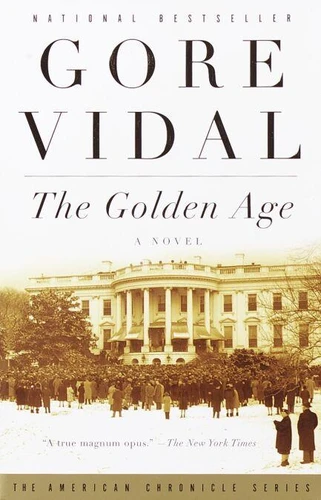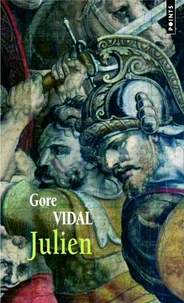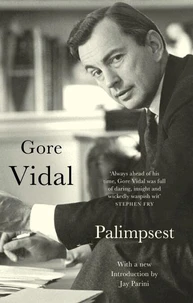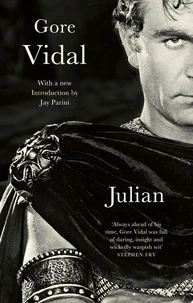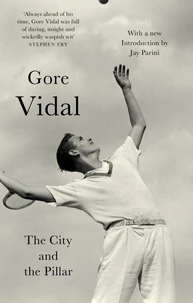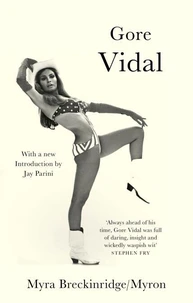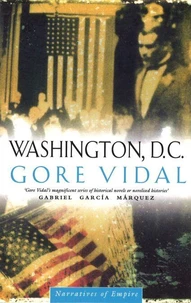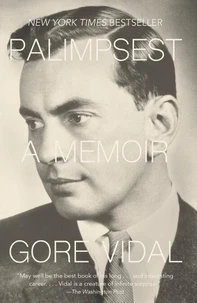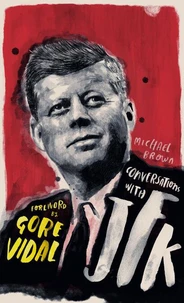Enfant terrible de la littérature américaine contemporaine, Gore Vidal, né le 3 octobre 1925, a une vingtaine dessais à son actif, mais aussi six pièces de théâtre et environ vingt-cinq romans. Il a débuté sa carrière dans les années 1950 en écrivant beaucoup pour la télévision et le cinéma, avant de se consacrer pleinement à la littérature. Cest avec « Un garçon près de la rivière » paru en 1948 qu'il se fait connaître car il ose aborder ouvertement le thème de lhomosexualité dans une Amérique encore bien puritaine. Depuis il est surtout connu pour ses grandes fresques historiques : « Julien » en 2006, « Empire » en 2008 ou « Lincoln » en 2010. Il ne faut pas passer à côté de « Palimpseste » paru en 2006, dans lequel il dresse une superbe galerie de portraits des personnalités quil a croisées dans la première partie de sa longue vie, et quil complète en 2008 par un deuxième tome « A lestime ».
The Golden Age. A Novel
Par :Formats :
Disponible dans votre compte client Decitre ou Furet du Nord dès validation de votre commande. Le format ePub protégé est :
- Compatible avec une lecture sur My Vivlio (smartphone, tablette, ordinateur)
- Compatible avec une lecture sur liseuses Vivlio
- Pour les liseuses autres que Vivlio, vous devez utiliser le logiciel Adobe Digital Edition. Non compatible avec la lecture sur les liseuses Kindle, Remarkable et Sony
- Non compatible avec un achat hors France métropolitaine
 , qui est-ce ?
, qui est-ce ?Notre partenaire de plateforme de lecture numérique où vous retrouverez l'ensemble de vos ebooks gratuitement
Pour en savoir plus sur nos ebooks, consultez notre aide en ligne ici
- Nombre de pages480
- FormatePub
- ISBN978-0-307-81661-0
- EAN9780307816610
- Date de parution14/03/2012
- Protection num.Adobe DRM
- Taille2 Mo
- Infos supplémentairesepub
- ÉditeurVintage
Résumé
The Golden Age is the concluding volume in Gore Vidal's celebrated and bestselling Narratives of Empire series-a unique pageant of the national experience from the United States' entry into World War Two to the end of the Korean War. The historical novel is once again in vogue, and Gore Vidal stands as its undisputed American master. In his six previous narratives of the American empire-Burr, Lincoln, 1876, Empire, Hollywood, and Washington, D.
C.-he has created a fictional portrait of our nation from its founding that is unmatched in our literature for its scope, intimacy, political intelligence, and eloquence. Each has been a major bestseller, and some have stirred controversy for their decidedly ironic and unillusioned view of the realities of American power and of the men and women who have exercised that power. The Golden Age is Vidal's crowning achievement, a vibrant tapestry of American political and cultural life from 1939 to 1954, when the epochal events of World War Two and the Cold War transformed America, once and for all, for good or ill, from a republic into an empire.
The sharp-eyed and sympathetic witnesses to these events are Caroline Sanford, Washington, D. C., newspaper publisher turned Hollywood pioneer producer-star, and Peter Sanford, her nephew and publisher of the independent intellectual journal The American Idea. They experience at first hand the masterful maneuvers of Franklin Roosevelt to bring a reluctant nation into World War Two, and later, the actions of Harry Truman that commit the nation to a decades-long twilight struggle against Communism-developments they regard with a marked skepticism, even though they end in an American global empire.
The locus of these events is Washington, D. C., yet the Hollywood film industry and the cultural centers of New York also play significant parts. In addition to presidents, the actual characters who appear so vividly in the pages of The Golden Age include Eleanor Roosevelt, Harry Hopkins, Wendell Willkie, William Randolph Hearst, Dean Acheson, Tennessee Williams, Joseph Alsop, Dawn Powell-and Gore Vidal himself.
The Golden Age offers up United States history as only Gore Vidal can, with unrivaled penetration, wit, and high drama, allied to a classical view of human fate. It is a supreme entertainment that will also change readers' understanding of American history and power.
C.-he has created a fictional portrait of our nation from its founding that is unmatched in our literature for its scope, intimacy, political intelligence, and eloquence. Each has been a major bestseller, and some have stirred controversy for their decidedly ironic and unillusioned view of the realities of American power and of the men and women who have exercised that power. The Golden Age is Vidal's crowning achievement, a vibrant tapestry of American political and cultural life from 1939 to 1954, when the epochal events of World War Two and the Cold War transformed America, once and for all, for good or ill, from a republic into an empire.
The sharp-eyed and sympathetic witnesses to these events are Caroline Sanford, Washington, D. C., newspaper publisher turned Hollywood pioneer producer-star, and Peter Sanford, her nephew and publisher of the independent intellectual journal The American Idea. They experience at first hand the masterful maneuvers of Franklin Roosevelt to bring a reluctant nation into World War Two, and later, the actions of Harry Truman that commit the nation to a decades-long twilight struggle against Communism-developments they regard with a marked skepticism, even though they end in an American global empire.
The locus of these events is Washington, D. C., yet the Hollywood film industry and the cultural centers of New York also play significant parts. In addition to presidents, the actual characters who appear so vividly in the pages of The Golden Age include Eleanor Roosevelt, Harry Hopkins, Wendell Willkie, William Randolph Hearst, Dean Acheson, Tennessee Williams, Joseph Alsop, Dawn Powell-and Gore Vidal himself.
The Golden Age offers up United States history as only Gore Vidal can, with unrivaled penetration, wit, and high drama, allied to a classical view of human fate. It is a supreme entertainment that will also change readers' understanding of American history and power.
The Golden Age is the concluding volume in Gore Vidal's celebrated and bestselling Narratives of Empire series-a unique pageant of the national experience from the United States' entry into World War Two to the end of the Korean War. The historical novel is once again in vogue, and Gore Vidal stands as its undisputed American master. In his six previous narratives of the American empire-Burr, Lincoln, 1876, Empire, Hollywood, and Washington, D.
C.-he has created a fictional portrait of our nation from its founding that is unmatched in our literature for its scope, intimacy, political intelligence, and eloquence. Each has been a major bestseller, and some have stirred controversy for their decidedly ironic and unillusioned view of the realities of American power and of the men and women who have exercised that power. The Golden Age is Vidal's crowning achievement, a vibrant tapestry of American political and cultural life from 1939 to 1954, when the epochal events of World War Two and the Cold War transformed America, once and for all, for good or ill, from a republic into an empire.
The sharp-eyed and sympathetic witnesses to these events are Caroline Sanford, Washington, D. C., newspaper publisher turned Hollywood pioneer producer-star, and Peter Sanford, her nephew and publisher of the independent intellectual journal The American Idea. They experience at first hand the masterful maneuvers of Franklin Roosevelt to bring a reluctant nation into World War Two, and later, the actions of Harry Truman that commit the nation to a decades-long twilight struggle against Communism-developments they regard with a marked skepticism, even though they end in an American global empire.
The locus of these events is Washington, D. C., yet the Hollywood film industry and the cultural centers of New York also play significant parts. In addition to presidents, the actual characters who appear so vividly in the pages of The Golden Age include Eleanor Roosevelt, Harry Hopkins, Wendell Willkie, William Randolph Hearst, Dean Acheson, Tennessee Williams, Joseph Alsop, Dawn Powell-and Gore Vidal himself.
The Golden Age offers up United States history as only Gore Vidal can, with unrivaled penetration, wit, and high drama, allied to a classical view of human fate. It is a supreme entertainment that will also change readers' understanding of American history and power.
C.-he has created a fictional portrait of our nation from its founding that is unmatched in our literature for its scope, intimacy, political intelligence, and eloquence. Each has been a major bestseller, and some have stirred controversy for their decidedly ironic and unillusioned view of the realities of American power and of the men and women who have exercised that power. The Golden Age is Vidal's crowning achievement, a vibrant tapestry of American political and cultural life from 1939 to 1954, when the epochal events of World War Two and the Cold War transformed America, once and for all, for good or ill, from a republic into an empire.
The sharp-eyed and sympathetic witnesses to these events are Caroline Sanford, Washington, D. C., newspaper publisher turned Hollywood pioneer producer-star, and Peter Sanford, her nephew and publisher of the independent intellectual journal The American Idea. They experience at first hand the masterful maneuvers of Franklin Roosevelt to bring a reluctant nation into World War Two, and later, the actions of Harry Truman that commit the nation to a decades-long twilight struggle against Communism-developments they regard with a marked skepticism, even though they end in an American global empire.
The locus of these events is Washington, D. C., yet the Hollywood film industry and the cultural centers of New York also play significant parts. In addition to presidents, the actual characters who appear so vividly in the pages of The Golden Age include Eleanor Roosevelt, Harry Hopkins, Wendell Willkie, William Randolph Hearst, Dean Acheson, Tennessee Williams, Joseph Alsop, Dawn Powell-and Gore Vidal himself.
The Golden Age offers up United States history as only Gore Vidal can, with unrivaled penetration, wit, and high drama, allied to a classical view of human fate. It is a supreme entertainment that will also change readers' understanding of American history and power.

